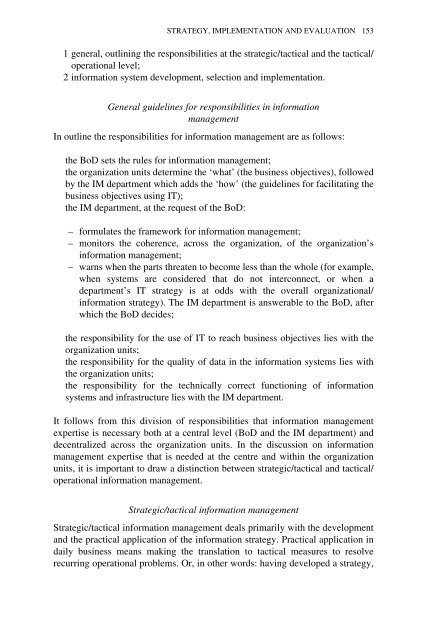Health Information Management: Integrating Information Technology ...
Health Information Management: Integrating Information Technology ...
Health Information Management: Integrating Information Technology ...
You also want an ePaper? Increase the reach of your titles
YUMPU automatically turns print PDFs into web optimized ePapers that Google loves.
STRATEGY, IMPLEMENTATION AND EVALUATION 153<br />
1 general, outlining the responsibilities at the strategic/tactical and the tactical/<br />
operational level;<br />
2 information system development, selection and implementation.<br />
General guidelines for responsibilities in information<br />
management<br />
In outline the responsibilities for information management are as follows:<br />
■<br />
■<br />
■<br />
the BoD sets the rules for information management;<br />
the organization units determine the ‘what’ (the business objectives), followed<br />
by the IM department which adds the ‘how’ (the guidelines for facilitating the<br />
business objectives using IT);<br />
the IM department, at the request of the BoD:<br />
– formulates the framework for information management;<br />
– monitors the coherence, across the organization, of the organization’s<br />
information management;<br />
– warns when the parts threaten to become less than the whole (for example,<br />
when systems are considered that do not interconnect, or when a<br />
department’s IT strategy is at odds with the overall organizational/<br />
information strategy). The IM department is answerable to the BoD, after<br />
which the BoD decides;<br />
■<br />
■<br />
■<br />
the responsibility for the use of IT to reach business objectives lies with the<br />
organization units;<br />
the responsibility for the quality of data in the information systems lies with<br />
the organization units;<br />
the responsibility for the technically correct functioning of information<br />
systems and infrastructure lies with the IM department.<br />
It follows from this division of responsibilities that information management<br />
expertise is necessary both at a central level (BoD and the IM department) and<br />
decentralized across the organization units. In the discussion on information<br />
management expertise that is needed at the centre and within the organization<br />
units, it is important to draw a distinction between strategic/tactical and tactical/<br />
operational information management.<br />
Strategic/tactical information management<br />
Strategic/tactical information management deals primarily with the development<br />
and the practical application of the information strategy. Practical application in<br />
daily business means making the translation to tactical measures to resolve<br />
recurring operational problems. Or, in other words: having developed a strategy,











